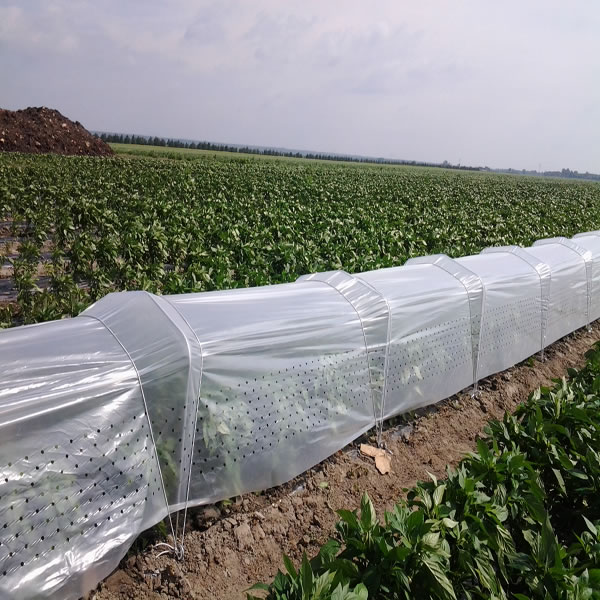Low Tunnels
Low tunnels are simple, inexpensive and effective structures used in agriculture and gardening to extend the growing season, protect plants from adverse weather conditions, and promote early or late-season crop production. They consist of curved or arched supports covered with clear plastic or fabric material, creating a protective tunnel-like structure over the plants.
Key Features and Benefits:
- Season extension: Low tunnels provide a microclimate that can help extend the growing season by several weeks or even months, allowing you to start planting earlier in the spring or continue harvesting later into the fall or winter. The covering material traps heat from the sun during the day, creating a warmer environment inside the tunnel, while also providing some protection against frost and cold temperatures.
- Frost protection: Low tunnels offer protection against frost, freezing temperatures and chilling winds, which can damage or kill sensitive plants.
- Pest and pest control: These structures can serve as a barrier to pests such as insects, birds, rodents, and larger animals, preventing them from accessing and damaging crops. Additionally, the covering material can help exclude certain insect pests, such as aphids, whiteflies, and flea beetles, reducing the need for chemical pesticides and promoting more sustainable pest management practices.
- Moisture regulation: Low tunnels can help regulate soil moisture levels by reducing evaporation and protecting plants from excessive rain or irrigation.
- Easy installation and maintenance: Low tunnels are relatively easy to construct, requiring minimal materials and labor. Make your own low tunnel using Tunnel-Flex or our Loop Hoops.They are also easy to maintain, requiring occasional monitoring and adjustments to ensure proper ventilation and pest control.
- Versatility: Low tunnels can be used to grow a wide range of crops, including vegetables, herbs, flowers and ornamentals. They are suitable for both small-scale and large-scale production and can be adapted to various growing systems, including raised beds, rows and containers.
Contact Berry Hill Irrigation Specialists to Learn More.
Results
Low tunnels are simple, inexpensive and effective structures used in agriculture and gardening to extend the growing season, protect plants from adverse weather conditions, and promote early or late-season crop production. They consist of curved or arched supports covered with clear plastic or fabric material, creating a protective tunnel-like structure over the plants.
Key Features and Benefits:
- Season extension: Low tunnels provide a microclimate that can help extend the growing season by several weeks or even months, allowing you to start planting earlier in the spring or continue harvesting later into the fall or winter. The covering material traps heat from the sun during the day, creating a warmer environment inside the tunnel, while also providing some protection against frost and cold temperatures.
- Frost protection: Low tunnels offer protection against frost, freezing temperatures and chilling winds, which can damage or kill sensitive plants.
- Pest and pest control: These structures can serve as a barrier to pests such as insects, birds, rodents, and larger animals, preventing them from accessing and damaging crops. Additionally, the covering material can help exclude certain insect pests, such as aphids, whiteflies, and flea beetles, reducing the need for chemical pesticides and promoting more sustainable pest management practices.
- Moisture regulation: Low tunnels can help regulate soil moisture levels by reducing evaporation and protecting plants from excessive rain or irrigation.
- Easy installation and maintenance: Low tunnels are relatively easy to construct, requiring minimal materials and labor. Make your own low tunnel using Tunnel-Flex or our Loop Hoops.They are also easy to maintain, requiring occasional monitoring and adjustments to ensure proper ventilation and pest control.
- Versatility: Low tunnels can be used to grow a wide range of crops, including vegetables, herbs, flowers and ornamentals. They are suitable for both small-scale and large-scale production and can be adapted to various growing systems, including raised beds, rows and containers.
Contact Berry Hill Irrigation Specialists to Learn More.


